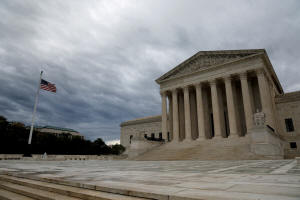U.S. Supreme Court weighs Turkish lender Halkbank's bid to avoid charges
 Send a link to a friend
Send a link to a friend
 [January 17, 2023]
By Andrew Chung [January 17, 2023]
By Andrew Chung
WASHINGTON (Reuters) - The U.S. Supreme Court is set on Tuesday to hear
arguments over a bid by Turkey's state-owned lender Halkbank to avoid
criminal charges in the United States for allegedly helping Iran evade
economic sanctions.
The justices are weighing Halkbank's appeal of a lower court's ruling in
favor of the U.S. government that allowed the prosecution of the bank to
proceed. The case tests Halkbank's contention that it is shielded from
prosecution because, as an entity majority owned by the Turkish
government, it has sovereign immunity.
The bank said its view is backed up by a 1976 U.S. law called the
Foreign Sovereign Immunities Act (FSIA) that limits the jurisdiction of
American courts over lawsuits against foreign countries. President Joe
Biden's administration contends that the law does not apply to criminal
prosecutions and, even if it did, the bank's actions fall under the
law's exception to sovereign immunity for misconduct involving
commercial activities.

Halkbank's case has complicated U.S.-Turkish relations, with Turkish
President Tayyip Erdogan calling the 2019 American charges against the
bank an "unlawful, ugly" step.
Prosecutors accused Halkbank of converting oil revenue into gold and
then cash to benefit Iranian interests, and documenting fake food
shipments to justify transfers of oil proceeds. They also said Halkbank
helped Iran secretly transfer $20 billion of restricted funds, with at
least $1 billion laundered through the U.S. financial system.
[to top of second column]
|

A view of the U.S. Supreme Court
building in Washington, U.S. October 3, 2022. REUTERS/Jonathan
Ernst/File Photo

Halkbank has pleaded not guilty to bank fraud, money laundering and
conspiracy charges over its alleged use of money servicers and front
companies in Iran, Turkey and the United Arab Emirates to evade
sanctions.
The Manhattan-based 2nd U.S. Circuit Court of Appeals in 2021 ruled
against Halkbank, concluding that even if the FSIA shielded the
bank, the conduct for which it was charged falls under the
commercial-activity exception.
Noting that international law prohibits one country from prosecuting
another in its own courts, Halkbank told the Supreme Court in a
filing that until the decisions in this case "no court had
authorized the criminal trial of a foreign sovereign or its
instrumentalities."
The Justice Department disagreed, calling Halkbank's claims
unprecedented.
"Federal prosecutions of foreign officials date back to the Founding
era," the government said in a filing, adding that as foreign
government-owned commercial entities expanded operations in the 20th
century, they were not exempted either," the department said in a
filing.
(Reporting by Andrew Chung; Editing by Will Dunham)
[© 2023 Thomson Reuters. All rights
reserved.]This material may not be published,
broadcast, rewritten or redistributed.
Thompson Reuters is solely responsible for this content. |